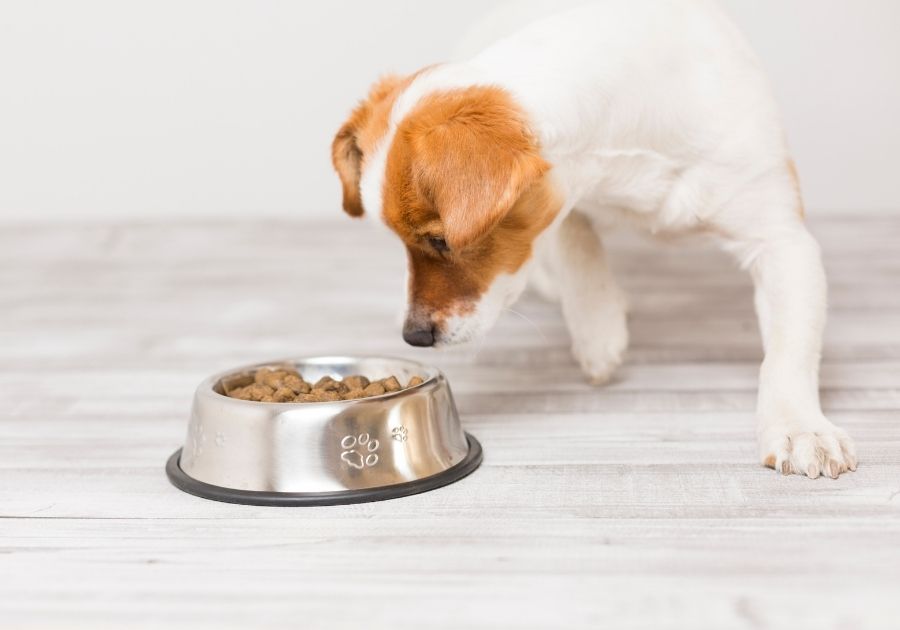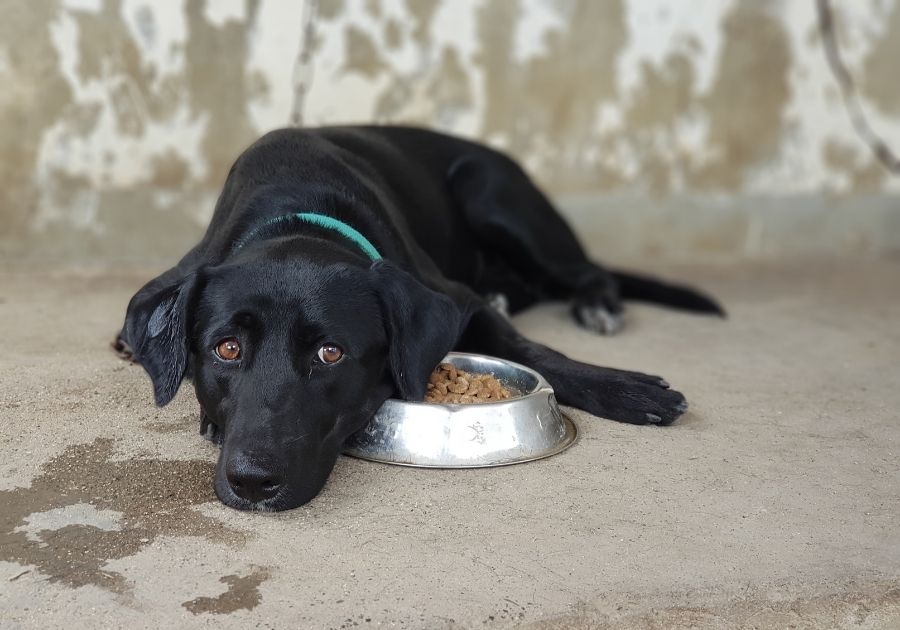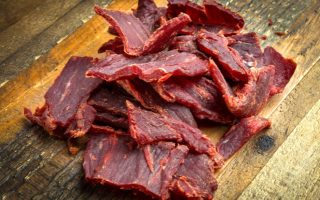Your dog might be a picky eater or might simply be unwell.
Whatever the case, you definitely have found yourself asking “how long can a dog go without food?“
In this article, the answer is laid bare.
There comes a time when every dog owner or parent asks themselves “just how long can a dog go without eating a meal?”
Whether your canine pal has a choosy appetite or a sensitive stomach, most dogs will skip an occasional meal sometimes.
When that skipped meal becomes two and then proceeds to metamorphose into more missed meals, it becomes a problem of great concern.
Knowing how safe it is for your fur baby to go without food will make you better prepared to take charge of these situations and provide a reasonable outcome.
How Long Can A Dog Go Without Food And Water?

Similarly, with humans, dogs are more prone to dehydration as opposed to starvation.
A dog will typically show vivid signs of dehydration after going 24 hours without water, depending on its health and immediate environment.
Dogs dehydrate faster if left outdoors on a particularly sunny day.
Most dogs have the ability to go without food for three to five days before experiencing any life-threatening health concerns. These notions are merely generalizations though.
The environment along with the activity level and individual health of your dog plays a crucial role in how long they can carry on without food or water.
Small pups for example are more prone to low blood sugar due to the underdevelopment of their body’s regulatory mechanisms.
In some puppies, going just ten to twelve hours without food can cause intense hypoglycemia (low blood sugar).
So, although it’s true that most healthy dogs can survive a day without water and three to five days without a meal, it is crucial to note that every dog’s requirements differ slightly.
The defects that each dog will experience after a period without food will differ.
Why Do Dogs Refuse Food?
There are many reasons why dogs experience loss of appetite.
While some of these reasons may not be life-threatening, it is important to determine the cause in order to get them eating as soon as possible.
Here are a few reasons your dog may not be eating:
Your Dog is Ill
One of the most common signs that your canine companion is unwell is a lack of appetite.
Although their illness can sometimes sort itself out through fasting, sick pups that show other signs such as weakness, diarrhea, or vomiting should immediately get veterinary care.
Your Dog Has a Teeth Problem
Bad oral health can cause your fur baby to avoid food. They most likely do not want to eat so as to avoid the pain of chewing.
Puppies are also likely to stop eating due to the discomfort caused by teething or losing a few teeth.
Adult dogs, on the other hand, might be periodontal diseases that should be treated immediately.
Your Dog Has Anxiety
Dogs are also very likely to lose appetite due to stress.
A number of things may be responsible for that, such as being separated from a loved one, losing a loved one, or sudden changes in their environment.
When this happens, they’ll typically display signs of aggression, skittishness, and fear.
Other Reasons Your Dog is Not Eating
- Oral tumor
- Gingivitis
- Oral trauma
- Tooth root abscess
- Neck pain
- Inflammation of muscles involved in chewing
- Inflammation of the esophagus
- Intestinal cancer
- Intestinal blockage
- Inflammation of the stomach (Gastritis)
- Diabetes
- Severe anxiety
- Side effects of medication Toxin exposure
What To Do If Your Dog Refuses Food

If you have a healthy dog that is suddenly refusing food for no known reason, here are a few things you should do:
Allow them Fast
It’s usually difficult for us to recall that dogs are more intimately in tune with the inner workings of their bodies than we are.
At certain times, fasting may be their body’s response to digestive problems or other health issues. So leaving them alone is usually the best option.
Have Them Examined
If your dog refuses to eat for more than two days, it will lose the energy required to support the functionality of its organs.
Before it gets to that, it’s advisable to have them checked and possibly treated for any underlying medical issues that might be causing them to lose appetite.
Persuade Them to Eat
According to experts, the sooner a dog eats, the faster it recovers. Any encouragement from your will speed up the process and get your fur baby back on his feet.
Try something other than kibble to whet their appetite. Bland foods or vegetables are a perfect choice.
Frequently Asked Questions
Does my dog have anorexia?
Animal eating disorders are very common. It is a loss of appetite and does not necessarily mean that one is hungry.
If your dog changes his eating habits and constantly refuses to eat, it will most likely be diagnosed with anorexia.
You should be particularly worried if your dog typically has healthy eating habits but suddenly starts to refuse food.
Why is my puppy not eating or drinking?
Dogs may refuse to eat due to changes in their environment, side effects of drugs, stress, and nausea.
Internal obstructions, pain, and dental problems can also cause a sudden loss of appetite in dogs.
There is often the possibility of your dog turning a blind eye to the food you’re offering them, but it is important that you determine this is the case with your veterinarian and rule out other causes.
However, there may be other reasons your dog is refusing to eat or drink, such as kidney or liver problems, cancer, or pyometra.
My dog is acting normal but isn’t eating. What should I do?
Never ignore a loss of appetite even if your dog’s behavior stays the same. It is usually a sign of a more serious health concern and should be examined by a vet.
Why is my dog is eating but refusing water?
A dog suffering from polydipsia (drinking large amounts of water) but refusing food may be a symptom of several things, including an infection, liver disease, or diabetes.
If your dog is taking in a lot of water but refusing to eat, it’s best to contact your vet as soon as possible in order to discuss diagnosis and treatment.
What should I do if my dog is refusing to eat?
Firstly, you have to observe your dog’s behavior. Secondly, check your pooch’s teeth and body. Thirdly, examine the environment and lastly re-examine all your actions.
This will give you a good head-start as to why your dog may not be eating.
Summary
Dogs can go without food for three to five days before they experience any life-threatening health concerns, depending on the age, health, and activity level.
A vast variety of reasons can be linked to why dogs refuse to eat, and it doesn’t always mean an underlying health problem.
Usually, if your dog skips a few meals, it is no cause for alarm provided they are well hydrated.
But in the event that they’ve gone several days on an empty stomach, it becomes crucial to take your dog to the vet immediately.
Your vet will check for any health conditions your dog might have and guide you on how best to provide all the care that your dog needs.
You May Also Like:
Complete Guide To Nutrition For Your Dog
References & Notes
- Mary Kearl, “Why Is My Dog a Picky Eater?,” AKC, 01 Jun 2021, accessed 25 Mar 2022, https://www.akc.org/expert-advice/nutrition/why-is-my-dog-a-picky-eater/.
- Memphis Veterinary Specialists & Emergency, “Dehydration in Dogs – Symptoms, Causes, and Treatments,” accessed 25 Mar 2022, https://www.memphisveterinaryspecialists.com/site/blog-cordova/2020/08/14/dehydration-in-dogs-causes-symptoms-treatment.
- Hilary Parker, “Dog Not Eating? Possible Causes and Appetite Solutions,” FETCH, 30 Aug 2022, accessed 25 Mar 2022, https://pets.webmd.com/dogs/guide/dog-not-eating-possible-causes-and-appetite-solutions.
- PetMD, “Sick Dogs Need to Eat Sooner Rather than Later,” accessed 25 Mar 2022, https://www.petmd.com/blogs/nutritionnuggets/dr-coates/2015/october/sick-dogs-need-eat-sooner-rather-later-33261.







